

Africa's unlikely rise* Africa had it good for ten years.
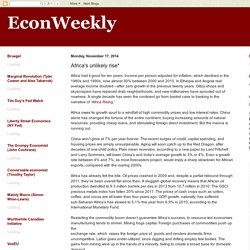
Income per person adjusted for inflation, which declined in the 1980s and 1990s, rose almost 30% between 2000 and 2010. In Ethiopia and Angola real average income doubled—after zero growth in the previous twenty years. Glitzy shops and skyscrapers have replaced drab neighborhoods, and new millionaires have sprouted out of nowhere. A single decade has seen the continent go from basket case to basking in the narrative of “Africa Rising.” Africa owes its growth spurt to a windfall of high commodity prices and low interest rates. Africa To Benefit From TFA Breakthrough, WTO Chief Says. 09 December 2014 5 1Google +0 0Delicious0Reddit0 The Director-General of the World Trade Organization (WTO), Roberto Azevêdo, has said that African nations will benefit in particular from the decision of WTO members to support the agreements at the Bali ministerial, including on the Trade Facilitation Agreement, which he said would assist their regional integration efforts in a very practical way.
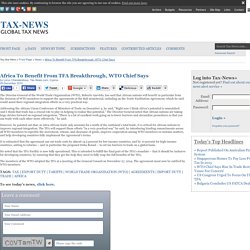
Addressing the African Union Conference of Ministers of Trade on December 4, he said, "Right now I think Africa's potential is unmatched. And I think that trade has a crucial role to play in helping to realize this potential. " The Director-General noted that African nations are taking huge strides forward on regional integration. A Radical But Possible Plan to Connect African Nations With Cargo Drones. A vision of 2020 Afrotech “Roads!

Where we’re going we don’t need roads!” —Back to the Future. You aren’t investing in Africa — and you’re missing out. This story has been corrected to provide the correct number of countries in Sub-Saharan Africa.
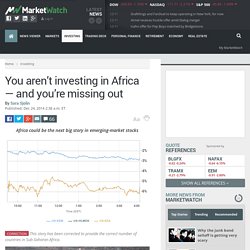
Bloomberg LONDON (MarketWatch) — If a financial adviser offered her clients a chance to invest in a country that expected economic growth of 6% or 7% a year for the next two decades, chances are the clients would jump at the prospect. But once they found out that country was in sub-Saharan Africa, chances are a lot of them would lose their nerve. With the Ebola virus ravaging the populations and economies of several West African countries, and armed conflicts claiming lives in Nigeria, Kenya and other nations, Africa continually generates the kind of headlines that make Westerners uneasy.
Sub-Saharan payroll, HR market booms. Gerhard Hartman by TINTSWALO BALOYI JOHANNESBURG - ORGANISATIONS in sub-Saharan Africa are seen moving away from manual management of their payrolls towards automated payroll solutions much to the boom of payroll and human resources (HR) market.
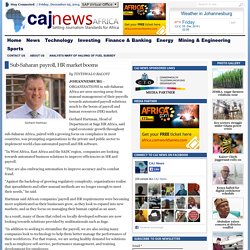
Gerhard Hartman, Head of Department at Sage HR Africa, said rapid economic growth throughout sub-Saharan Africa, paired with a growing focus on compliance in most countries, was prompting organisations in the private and public sector to implement world-class automated payroll and HR software. “In West Africa, East Africa and the SADC region, companies are looking towards automated business solutions to improve efficiencies in HR and payroll. “They are also embracing automation to improve accuracy and to combat fraud. “Against the backdrop of growing regulatory complexity, organisations realise that spreadsheets and other manual methods are no longer enough to meet their needs,” he said.
ACR_Chapter2.3_2013.pdf. 20130813121743289489uJudJb9GkE.pdf. Inside_Africa_Eaglestone_Advisory_9_June_2014.pdf. What western investors want from African entrepreneurs. Africa is already home to a vigorous entrepreneurship scene.
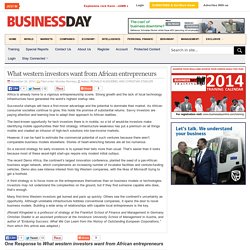
Strong growth and the lack of local technology infrastructure have generated the world’s highest startup rate. Successful startups will have a first-mover advantage and the potential to dominate their market. As African consumer societies continue to grow, this holds the promise of substantial returns. Savvy investors are paying attention and learning how to adapt their approach to African realities. The best-known opportunity for tech investors there is in mobile, so a lot of would-be investors make identifying mobile opportunities their first strategy. infrastructure weakness has put a premium on all things mobile and created an infusion of high-tech solutions into low-income markets.
However, it can be hard to estimate the commercial potential of such ventures because there aren’t comparable business models elsewhere. So a second strategy for early investors is to spread their bets more than usual. Yuan's footprint expanding quickly in Africa. Shared prosperity: Algeria and Nigeria. Algeria and Nigeria have a lot in common.
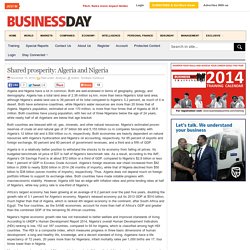
Both are well-endowed in terms of geography, geology, and demography. Algeria has a total land area of 2.38 million sq km, more than twice Nigeria’s total land area; although Nigeria’s arable land use is 39 percent of its total compared to Algeria’s 3.2 percent, as much of it is desert. Both have extensive coastlines, while Nigeria’s water resources are more than 20 times that of Algeria. Nigeria’s population, estimated at over 170 million, is more than four times that of Algeria at 38.8 million. Both countries have young population, with two out of three Nigerians below the age of 24 years, while nearly half of all Algerians are below that age bracket.
Both countries are blessed with oil, gas, minerals, and other natural resources. Algeria is in a relatively better position to withstand the shocks to its economy from falling oil prices. African Armies Are On A Spending Spree. African countries need to develop their own defense industries and stop buying weapons from foreign countries AFRICANGLOBE – The north-eastern Nigerian town of Chibok is spared little.
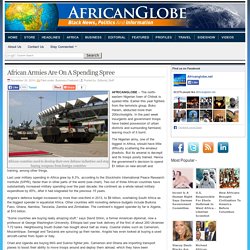
Earlier this year fighters from the terrorists group, Boko Haram, abducted more than 200schoolgirls. In the past week insurgents and government troops have traded possession of urban districts and surrounding farmland, leaving much of it burnt. African buyers lead prime central London property purchases, says agency. It’s not wealthy Russians of Middle Eastern buyers who have bought the most prime central London property over the last few years, but Africans, says the Black Brick agency Wealthy African property buyers are the largest buyers of prime property in central London, according to new research.

Independent property buying agency, Black Brick says Africans are involved in getting on for half of prime central London property sales since January 2007. In total, Black Brick has represented 35 different nationalities, with Africans forming the highest percentage of buyers at 43.7%, followed by Middle Eastern buyers at 17.1% and Asian and UK buyers tied in third at 10%. Camilla Dell, Founder and Managing Partner of Black Brick, tells OPP Connect, “Although the perception is that the majority of Prime Central London’s overseas buyers are Russian or Middle Eastern, Africans have always had a big affinity with the UK and London.
There are signs that London is set to attract more investors from Angola. Bank on poor women and phones to drive growth in Africa, experts say. NAIROBI (Thomson Reuters Foundation) - Mobile phone technology can help to bring financial services to the 80 percent of African women who do not have a bank account and bolster the growth of the world's poorest continent, Nigeria's finance minister, Ngozi Okonjo-Iweala, said on Monday.
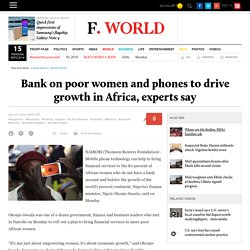
Okonjo-Iweala was one of a dozen government, finance and business leaders who met in Nairobi on Monday to roll out a plan to bring financial services to more poor African women. "It's not just about empowering women, it's about economic growth," said Okonjo-Iweala, honorary co-chair of the newly-formed Africa Advisory Council of the U.S. -based charity Women's World Banking. "Unless we can make access to finance easier for women in their businesses, we will be missing out on a significant portion of growth within our economies. " She cited a study by accounting firm Ernst & Young which shows that 75 percent of consumer spending power will be in the hands of women by 2028. Deloitte predicts Africa’s GDP to expand by 50% by 2019 - Cape Business News. Opinion article by: Deloitte, a consulting and business advisory firm. "Africa’s gross domestic product (GDP) will grow by 50% to $3.7tn over the next five years as the continent’s rapidly expanding middle class helps drive faster rates of urbanisation and increased consumer demand for goods and services.
The predicted expansion of Africa’s economy will see mobile subscription penetration grow from 72% currently to 97% by 2017 as the continent adds 334 million new smartphone subscribers over that timeframe, according to a new report by Deloitte titled “Africa: A 21st Century View.” Africa’s middle class is also expected to increase to more than half a billion people by 2030, says Deloitte, which broadly defines the continent’s middle class as those earning between $2 and $20 per day.
George says that Africa’s economic story has thus far been focused on natural resource and commodity exports. Despite significant growth prospects, Africa remains complex and carries risk. Scoring Africa. Africa accounts for roughly 15% of the world’s population and 20% of the world’s land mass. It's made up of 54 countries, hundreds of ethnic groups, 7 major language families (with 2-3 thousand different languages), deserts, jungles, tropics, and subarctics.
However, despite Africa's abundant resources and diversity, it still remains the poorest and most underdeveloped continent on earth. Africa Makes Strides in Corporate Accounting, Governance. Andela, General Assembly to train web developers in Africa. | Nov. 8, 2014, 6:06 a.m. Image: By BiztechAfrica Andela, a global talent accelerator currently operating one of the most selective web development training programs in the world, has announced a partnership with General Assembly, the global educational institution offering instruction and opportunity in technology, business and design. Andela finds the brightest young people in Africa and gives them the training and mentorship needed to thrive as full-time, remote software developers for companies around the world. Currently fewer than one percent of applicants are accepted to the program.
The partnership will allow Andela developers, as well as thousands of applicants who were not able to join the program, the opportunity to pursue an education in technology through General Assembly's educational offerings, including its online Web Design Circuit, Front Row and research and curriculum from GA’s most popular courses and workshops, at no cost. Tags. Afrique : 70 % des frontières maritimes encore indéterminées. L'exploration pétrolière offshore au large des côtes africains a connu une croissance exponentielle. © Offshore Magazine Selon des experts juridiques, un tiers à peine des frontières maritimes en Afrique ont fait l'objet d'accords définitifs entre États.
La Côte d'Ivoire et le Ghana en Afrique de l'Ouest, la Somalie et le Kenya à la pointe orientale du continent, ont décidé au cours du dernier semestre de porter devant des instances juridiques internationales les différends les opposant au sujet de leurs frontières maritimes. >>> Le Ghana demande à un tribunal international de trancher son différend maritime avec la Côte d'Ivoire Cette solution de dernier recours intervient après des années de négociations bilatérales infructueuses. Mais, plus important, la question de la délimitation de leurs frontières maritimes n'a gagné réellement en importance que durant la dernière décennie, à mesure que les prospections pétrolières et gazières au large de leurs côtes ont pris de l'ampleur.
Africa’s economy set for dramatic changes – Carlos Lopes. Following the launch of the 2014 Economic Report on Africa in Abuja, Nigeria, Mr. Carlos Lopes, the executive secretary of the Economic Commission for Africa, attended the New York launch of the same report. The report addresses two essential questions: what are the right policies for industrialization and what role can the private and public sectors play? In an exclusive interview with Africa Renewal’s Kingsley Ighobor, Mr.
Lopes explored these issues and identified countries holding enormous industrialization potential. L’Afrique Sub-Saharienne enregistre le plus grand nombre de reformes portant sur la réglementation des affaires à travers le monde. Washington, DC, le 29 Octobre, 2014 - Un nouveau rapport du Groupe de la Banque mondiale estime que l'Afrique Sub-Saharienne a enregistré le plus grand nombre de réformes de la réglementation des affaires en 2013/14.
Au cours de la dernière année 74 pour cent des économies de la région ont amélioré la réglementation de leur environnement des affaires pour les entrepreneurs locaux. Publié aujourd'hui, Doing Business 2015: au-delà de l’efficience constate que le Bénin, la République Démocratique du Congo, la Côte d'Ivoire, le Sénégal et le Togo sont parmi les 10 premiers pays ayant le plus amélioré leur réglementation des affaires parmi les 189 économies couvertes par le rapport. Depuis 2005, tous les pays de la région ont amélioré l'environnement réglementaire des affaires pour les petites et moyennes entreprises - le Rwanda en tête, suivi par l’ile Maurice et la Sierra Leone. African investors discover routes to riches beyond commodities. Africa primed for growth - but it's intricate. Africa has been earmarked as a big growth market in which to operate, but you need to know what you’re doing to achieve any kind of success in this dynamic environment, says LOUISE ROBINSON.
Assuming improvement in the global economic condition, the Economist predicts that Africa’s economic growth that stood at 4.2% in 2012 is projected to accelerate to 4.5% in 2014. Sub-Saharan Africans are eager for progress and many investors see the region as a potential gold mine. While poor infrastructure can make logistics a headache, it also provides numerous opportunities. Take Lagos for example. Number of Billionaires Doubles Since Financial Crisis As Inequality Spirals Out of Control. Press release Rising inequality could set the fight against poverty back by decades (1), Oxfam warned today as it published a new report showing that the number of billionaires worldwide has more than doubled since the financial crisis. (2) The report, Even it Up: Time to End Extreme Inequality, details how the richest people in the world have more money than they could ever spend while hundreds of millions live in abject poverty without essential health care or basic education.
In countries around the world, prosperity is not trickling down to ordinary people, but up to those at the top, whose exceptional wealth is growing ever more rapidly. One-third of Africans have entered middle class. Johannesburg (AFP) - More than one in three Africans have entered the middle class in the past decade, and their numbers are set to swell thanks to rapid economic growth, a study showed Monday. Commerce Sud-Sud : la part de l’Afrique bientôt à 70% Smartphones Sold in Middle East and Africa to Hit 64 Million in Q2 2014. The Middle East and Africa (MEA) handset market grew to its largest size in ten quarters in Q2 2014, expanding 27 per cent year-on-year to total 64 million units. The latest insights from International Data Corporation (IDC) show that the majority of this growth was seen in the smartphone category, with a major shift underway in the composition of the market.
Indeed, smartphone share of the overall MEA handset market jumped 13 percentage points year on year to reach 40 per cent in Q2 2014, with that figure reaching as high as 75-80 per cent in some of the region's more developed countries. Why African companies should view China as a market, not as competition. Ebola, Oil Slump Take Toll on African Sovereign Bonds - WSJ. Africa’s Biggest Lender Woos Swiss Investors to Property. FirstRand Ltd. Will New Airlines Crack Africa’s Tough Budget Airspace? Upnairobi.com Traffic on African skies is increasing as more budget and low cost airlines begin to make flights, jostling for a blossoming market driven by a growing middle class across major cities on the continent. Fastjet, Flydubai, JamboJet, and Mango are some of the airlines that are opening new flight routes to capture the growing demand from new travelers who are willing to pay for an air ticket, if the price is just right.
Decades of low investment in road and railway networks on the continent coupled with a growing middle class has given birth to a new market for airlines; time conscious passengers want the convenience and comfort that air travel affords them. Business travellers have also increased over the couple of years, locally and internationally as they folk to look for deals in energy, construction, mining, oil and gas industries.
Airlines say that there is demand from these travellers who are willing to buy a ticket if the price is right. Satellite industry defends importance of C band in Africa. Rise of super cities to spur rental growth over 5 years. Africa - Mobile Broadband Market. 6 Ways You Can Profit From Booming Investment in Africa. Gulf of Guinea: A Regional Solution to Piracy? Roar of Africa's lion economies is unstoppable. Bowing To IMF Pressure, Ghana Becomes Third African Country to Cut Fuel Subsidy This Summer. Jobs, security, investment: Africa’s next billion. Luxury heavyweights eye Africa’s newly affluent. The African data gap: What it means for business.
Roadblocks for African women traders constrain continent’s development - Opinion. Pastel to help businesses with African expansion. Africa Is Poised To Power The Next Phase Of Global Economic Growth. Sub-Saharan Africa: Mega Sporting Events – The New Cash Cow. Câble à fibres optiques Maroc-Mali. To acquire or not to acquire in Africa. La vie plus chère à Abidjan, Dakar et Douala qu’à Bruxelles, Berlin, Miami... High stakes for high reward? Real estate funds come to Africa.
Africa’s top 10 future investment cities. Julien Lefilleur «Le financement des PME en Afrique représente une priorité pour Proparco» Top 10 risks worth considering when expanding into Africa - ContinuitySA Press Office. Africa To Hold Biggest Labour Force, Fastest Economic Growth By 2040. Welcome to Forbes. Région du Sahel : Les richesses attisent les convoitises - Mali Actualités : Infos de dernières Minutes et Actualités sur le Mali.
AFDB Boss Says Ebola Infected Countries May Lose1.5% GDP. Booming African economies gear up to emulate Asians. Africa’s middle-class boom is real, study shows – and it’s gaining speed. Africa’s Middle Class Is Booming, While America’s Is Shrinking. L'Afrique progresse dans le classement 2014 de l'indice mondial de l'innovation. Phone chargers for Africa and 3D-printing in space win Branson backing. AFRICA UN CONTINENTE DE OPORTUNIDADES PARA LA PYME ESPANOLA - AFRICA_CONTINENTE_DE_OPORTUNIDADES.pdf. 2014_MasterCard_African_Cities_Growth_Index.pdf. The story of the African consumer. Bottom line: It's about Africa. Presentation_CITAC_Africa a great place to invest.pdf.
Africa FDI at decade high. Africa Consumers Consumers Everywhere - Consumer Products & Retail Ideas and Insights - A.T. Kearney. Over 57% of African GDP is contributed by four countries. Africa’s consumer market will reach $1.4 trillion by 2020, surpassing India and China - technigeria.com.ng. Improving Infrastructure Is Creating New Investment Opportunities in Africa. Sub-Saharan Africa Is the New Investment Frontier. Packaging in Africa: Fast-Moving Consumer Goods. L'Afrique Compte 55 Milliardaires, Plus Que L’Amérique Latine. Africa, India, the Middle East will lead the mobile boom in next 5 years. Pan-Africa Free-Trade Could be Worth $2.6 Trillion.
Microsoft Word - Nana Sao Speech_July 2010 - WEB_Goldman_Sachs_Africa_Leadership_Retreat.pdf. Africa’s collective GDP is at least a third larger than officials say it is - Quartz. The surge in Africa direct investment – beyondbrics. New report reveals Africa’s fastest growing cities. Silicon Valley Looks to Cash In on Africa's Mobile Growth. L’Afrique s’en sort mieux que l’Asie - Internationale. Private Investors for Africa - Opportunities and Challenges. Africa's Consumer Story. Middle class African consumer market to be worth $1 trillion by 2020.
Africa proving highly competitive for cellphone marketers. Imagine A Future Where Africa Leapfrogs Developed Economies. Africa: Ultimate Proving Ground for the Cloud? Africa Is Richer Than You Think The Rising Middle Class of Africa - Grail-Research-The-Rising-Middle-Class-Africa.pdf. A global coalition working to make broadband affordable for all.
Watson, IBM’s super computer, is now putting its problem-solving skills to work in Africa. African Packaging Organisation, Tanzanian Institute of Packaging - ABDAS. In 2 to 3 years gazillionaires will be coming out of Africa. La Banque mondiale prévoit une croissance annuelle de plus de 5,2% en Afrique subsaharienne de 2014 à 2016. Don’t count out the African shopper.